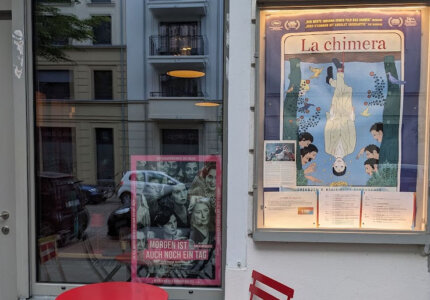Vernon Subutex: a Society on its Way Down
The story of Vernon Subutex and his unhappy contemporaries depicts a society between exuberance and homelessness. It’s actually a three-part series, but I liked the first book as an unfinished story. Virginie Despentes aptly summed up what’s happening in society back in 2015. It’s a shame that the book’s German version wasn’t released and promoted in time, or at least it didn’t reach me until even later. Apparently, some exciting new releases from the last few years are still waiting to be discovered!

Generation Self-Pity in their Midlife-Crisis
Some seemingly insignificant books are fascinating even when they initially seem too boring and irrelevant. Once again, I was captivated by the subjective complaints of old white men, although this time mostly in indirect speech from a female French “scandal author’s” perspective. Vernon Subutex, the title and protagonist of her novel of the same name, reflects society from his perspective as a former record salesman forced to stay with former friends from good old times long gone, where he has to listen their complaints being dissatisfied with their lives in very different ways. “THE social novel of our time,” as the magazine’s arts pages put it, is part of a trilogy by Virginie Despentes unmasking (not only) “Generation X” as Generation Self-Pity. We see professionally successful but completely frustrated Parisians who make life difficult for each other, always blame others and indulge in short-sighted hate speech without looking beyond their own bubble. I found it particularly worth reading because of the detached view of the relegated person who, as one of the few slackers still alive, knows little about today’s society and seems surprisingly relaxed about his decline.
Roxy isn’t everywhere
The books’s title Roxy had been chosen by Johann von Bülow allegedly, “because there is a ‘Roxy’ in every town”, which isn’t true of course. However, this is another book that, apart from its nostalgia and local color, tells the life stories of individuals connected by something that I wouldn’t call friendship, considering that at least one of them is very selfish and unaffectionate. Roxy is a nostalgic review apart from the mainstream (“would my life have taken another turn if I had answered 1860 back then?”) My summer’s holiday vibe compensated the book’s summertime sadness when I read it last year. If you’re after more depth and darkness, I’d rather recommend reading Darkgreen almost black by Mareike Fallwickl.
Househusbands, Hipsters, and Village Punks
A suitable addition would be the novel ‘The Househusband’ by Wlada Kolosowa with illustrations by Raúl Soria. In my opinion, this is an entertaining, socially critical but also clichéd Berlin novel about the dilemma of an unsuccessful graphic artist caught between ambition and unemployment, who is bullied for being a cowardly couch potato and ends up befriending another outsider. Unfortunately, the novel makes the personal problems and prejudices of the two men so much its own that everyone else, including the neighbourhood and the city fade into a stencil-like backdrop. Nevertheless, in times of overrated works of art such as Martin Suter’s Melody, this is still an above-average recommendation!
Another addition, out of line, out of time, and discovered by chance: in Dorfpunks (Village Punks), the singer Rocko Schamoni recalls his youth in the countryside in the seventies. An honest autobiography that doesn’t leave out despair, booze and brawls. It doesn’t sacrifice its authenticity to autofictional storytelling, but it’s still well worth reading!
Prelminiary Footnote: Goosen, Stanišic, and Krien
“Also mention Goosen,” I noted below the first draft of this article, which sounds even less original and even more irrelevant than the ones mentioned above, but Goosen’s protagonists are the small Vernons of Germany’s industrial Ruhr area celebrating their 18th birthday in their neighbors’ allotment garden, who still know the German wall from both sides, and who have muddled through their lives somehow. Frank Goosen’s Liegen lernen was even made a film, the garden plot and backyard scenes have been featured in live readings, but I’d recommend Kein Wunder (no wonder) as a first book to get into his stories.-
Saša Stanišić is too popular to be an insider’s tip, and I didn’t even finish Vor dem Fest (before the celebration). However, Stanišić sounds like a Brandenburg-based brother of Goosen, so to say. Speaking of East Germany, Daniela Krien is another recommendation. I already blogged about Irgendwann werden wir uns alles erzählen, but her other works like Die Liebe im Ernstfall also belong on your stack of unread books.

Crazy Clouds
Last, but not least, It is a special book that touched me personally, not only because I read the advertisement “The band Erdmöbel is still looking for a bass player” week after week during my time in Münster. They already had a singer and songwriter, and because songs are perhaps too short for some things, Markus Berges has written a book that is recognizably autobiographical. The journey on the tour bus to the only gig on a tour of Holland could just as easily have been written by Goosen. The intimidating petit bourgeoisie and the gentle rebellion of young people doing care work instead of compulsory military service, which confronts the shy boy with completely different realities of life, and the freedom of this blatant coming-of-age situation, as unspectacular as it may seem to outsiders, are not unfamiliar to me. Irre Wolken is a personal recommendation.




